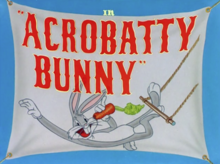| Acrobatty Bunny | |
|---|---|
 | |
| Directed by | Robert McKimson |
| Story by | Warren Foster |
| Starring | Mel Blanc |
| Music by | Carl W. Stalling |
| Animation by |
Richard Bickenbach Art Davis Cal Dalton |
| Layouts by | Cornett Wood |
| Backgrounds by | Richard H. Thomas |
| Color process | Technicolor |
Production company | |
| Distributed by | Warner Bros. Pictures |
Release date |
|
Running time | 7:43 |
| Language | English |
Acrobatty Bunny is a 1946 Warner Bros. Looney Tunes short directed by Robert McKimson. [1] The short was released on June 29, 1946, and stars Bugs Bunny and Nero the Lion. [2] This was the first cartoon McKimson directed that starred Bugs Bunny.
Plot

Bugs Bunny has an encounter with Nero, a lion residing above his rabbit hole amidst the setup of a circus. Bugs navigates a series of comical escapades as he evades Nero's attempts to capture him, leading to a lively chase throughout the circus grounds.
In a turn of events, Bugs dons a clown disguise to engage Nero in playful antics, but their interaction escalates into a frenzied pursuit under the circus tent. Employing his ingenuity, Bugs outwits Nero by luring him into a cannon, culminating in a humorous spectacle where Nero unwittingly performs a hula dance while Bugs entertains with a ukulele.
Bugs then breaks the fourth wall, addressing the audience in a jovial manner and offering their services for various events, all while continuing to provide entertainment through music.
Reception
Animation critic Jerry Beck writes, "Nonstop action and gags, Acrobatty Bunny is a pure Bugs Bunny cartoon, demonstrating what the rabbit does best: using his brains to heckle an aggressive bully and stay one step ahead of his opponent. Robert McKimson's very first Bugs Bunny cartoon is one of the funniest ever made." [3]
Home media
The cartoon can be found on the Looney Tunes Golden Collection: Volume 3 DVD. It is also available on the Marx Brothers' Night in Casablanca DVD (2004).
References
- ^ Lenburg, Jeff (1999). The Encyclopedia of Animated Cartoons. Checkmark Books. p. 60. ISBN 0-8160-3831-7. Retrieved 6 June 2020.
- ^ Beck, Jerry; Friedwald, Will (1989). Looney Tunes and Merrie Melodies: A Complete Illustrated Guide to the Warner Bros. Cartoons. Henry Holt and Co. p. 168. ISBN 0-8050-0894-2.
- ^ Beck, Jerry, ed. (2020). The 100 Greatest Looney Tunes Cartoons. Insight Editions. pp. 4–5. ISBN 978-1-64722-137-9.
External links
- 1946 films
- 1946 short films
- 1946 animated films
- Looney Tunes shorts
- Warner Bros. Cartoons animated short films
- Films directed by Robert McKimson
- Circus films
- Bugs Bunny films
- Animated films about lions
- 1940s Warner Bros. animated short films
- Films with screenplays by Warren Foster
- Looney Tunes stubs